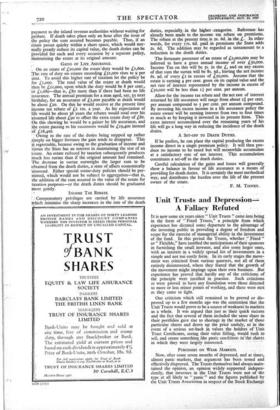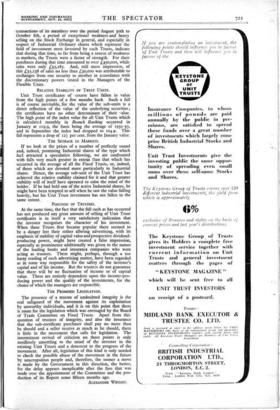Unit Trusts and Depression— A Fallacy Refuted IT is now
some six years since " Unit Trusts " came into being in the form of " Fixed Trusts," a principle from which experience has dictated some departure to the advantage of the investing public in providing a degree of freedom and scope for the exercise of managerial ability in the investment of the fund. In this period the Trusts, whether :` Fixed " or " Flexible," have justified the anticipations of their sponsors in furnishing the small investor, and also some larger ones, With an interest in a. widely spread list of investments in a simple and not too costly form. In its early stages the move- ment was criticised from various quarters, not all of them entirely disinterested, where they feared that the growth of the movement might impinge upon their own business. But experience has proved that hardly any of the criticisms of the principle were justified in practice. Such criticisms as were proved to have any foundation were those directed to more or less minor points of working, and these were met as they came to light.
One criticism which still remained to be proved or dis- proved up to a few months ago was the contention that the Unit Trusts would prove to be a source of weakness to markets as a whole. It was argued that just as their quick success and the fact that several of them included the same share in their portfolios gave rise to shortage in the market of those particular shares and drove up the price unduly, so in the event of a serious set-back in values the holders of Unit Trust Certificates, seeing their value falling, would rush to sell, and create something like panic conditions in-the shares in which they were largely interested.
PURCHASES ON WEAK MARKETS.
Now, after some seven months of depressed, and at times, almost panic markets, that argument has been tested and effectively disproved. The Trusts themselves had always main- tained the opinion, an opinion widely supported indepen- dently, that investors in the Unit Trusts were not of the type at all likely to ".panic " and the figures published by the Unit Trusts Association in respect of the Stock Exchange - transactions of its members over the period August 30th to October 8th, a period of exceptional weakness and heavy selling on the- Stock Exchange in general, and especially in respect of Industrial Ordinary shares which represent the field of investment most favoured by such Trusts, indicate that during that time, so far from being a source of weakness to markets, the Trusts were a factor of strength. For their purchases during that time amounted to over £450,000, while sales were only £35,185. And, still more impressive, of this £35,138 of sales no less than £30,000 was attributable to exchanges from one security to another in accordance with the discretionary powers vested in the Managers of the Flexible Units.
RELATIVE STABILITY OF TRUST UNITS.
Unit Trust certificates of course have fallen in value from the high points of a few months back. Such a fall is of course inevitable, for the value of the sub-units is a direct reflection of the value of the underlying securities ; the certificates have no other determinant of their '-alue. The high point of the index value for all Unit Trusts which is calculated monthly in Branch Banking occurred in January at 119.9, the basis being the average of 1931-35, and in September the index had dropped to 104.9. This fall represents a drop of 12:1 per cent. from the January value.
THE SETBACK IN MARKETS.
If we look at the prices of a number of perfectly sound and, indeed, promising Industrial shares of the type which had attracted a speculative following, we are confronted with falls very much greater in extent than that which has occurred in the average of all the Fixed Trusts, or, indeed, of those which are devoted more particularly to Industrial shares. Hence, the average sub-unit of the Unit Trust has achieved the relative stability claimed for it -and that greater stability will of itself have operated to calm the mind of the holder. If he had held one of the active Industrial shares, he might have been tempted to sell when he saw the value falling heavily, but his Unit Trust investment has not fallen to the same extent.
POSITION OF TRUSTEES.
At the same time, the fact that the fall such as has occurred has not produced any great amount of selling of Unit Trust certificates is in itself a very satisfactory indication that the investor recognises the character of his investment. When these Trusts first became popular there seemed to be a danger lest their rather alluring advertising, with its emphasis of stability of capital value and prospective dividend- producing power, might have created a false impression, especially as prominence additionally was given to the names of the leading banks and insurance companies who were acting as trustees. These might, perhaps, through a too hasty reading of such advertising matter, have been regarded as in some way responsible for the safety of the investor's capital and of his income. But the trustees do not guarantee that there will be no fluctuation of income or of capital value. These are entirely dependent upon the income-pro- ducing power and the quality of the investments, for the choice of which the managers are responsible.
THE PROMISED LEGISLATION.
The presence of a trustee of undoubted integrity is the real safeguard of the movement against its exploitation by unworthy individuals, and it is on this point that there is room for the legislation which was envisaged by the Board of Trade Committee on Fixed Trusts. Apart from this question of trustees of integrity, and also the insurance that the sub-certificate purchaser shall pay no more than he should and a seller receive as much as he should, there is little in the movement that calls for legislation. The intermittent revival of criticism on these points is only needlessly unsettling to the mind of the investor in the existing Unit Trusts and a deterrent to the progress of the movement. After all, legislation of this kind is only needed to check the possible abuse of the movement in the future by unscrupulous people and, therefore, the sooner a move is made by the Government in this direction, the better, for the delay appears inexplicable after the fuss that was made over the appointment of the Committee and the pro- duction of its Report some fifteen_ months ago.
ALEXANDER WRIGHT.































































 Previous page
Previous page